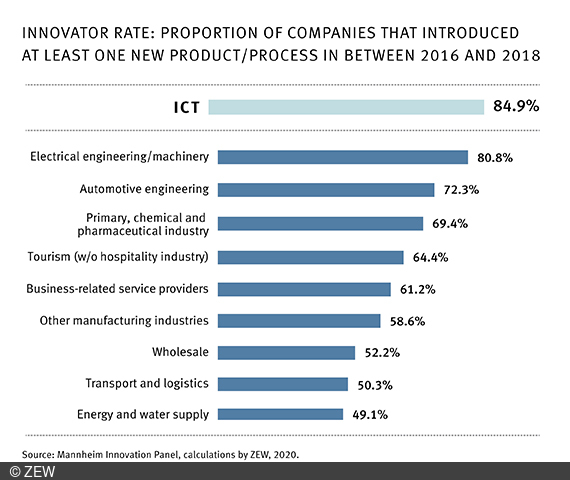ICT Sector Key for Future Competitiveness of German Economy
ResearchIn 2019, the information and communications technology (ICT) sector generated sales of almost 281 billion euros, thus growing for the sixth consecutive year. Gross value added and capital expenditure also reached new record levels: for the first time, the sector generated added value of over 120 billion euros and invested more than 20 billion euros. This is also reflected in the number of employees that are subject to social insurance contributions and self-employed individuals in the ICT sector, which rose to around 1.28 million in 2019. This represents an increase of around 43,000 jobs compared to the previous year. In 2019, the ICT sector generated around 5.1 per cent of the value added of the entire commercial economy, which is attributable almost exclusively to ICT service providers. Their gross value added has been growing continuously since 2010 and amounted to 107 billion euros in 2019. However, the gross value added of the ICT hardware segment also increased year-on-year from 13 to 14 billion euros.
These and other results can be found in the study “IKT-Branchenbild 2020” (“ICT Sector Profile 2020”) published today, which the ZEW Mannheim produces annually on behalf of the German Federal Ministry for Economic Affairs and Energy.
A particular strength of the ICT sector is its ability to innovate. This is reflected, for example, in the innovator rate, i.e. the proportion of companies that have introduced a new or considerably improved product or process in the last three years. With an innovator rate of 85 per cent, the ICT sector ranks first compared to other sectors, ahead of electrical engineering and machinery (81 per cent) as well as automotive engineering (72 per cent). The ICT sector also demonstrates its innovative strength in terms of the share of sales generated with market innovations. With a share of eight per cent, it ranks second among German industries and is only exceeded by the automotive industry (13 per cent). A further indicator of the innovation potential of a sector is the number of start-ups. With around 6,860 new companies and a start-up rate of 6.1 per cent in 2019, the ICT sector comes in second place again compared to other industries. The start-up rate measures the share of newly founded companies in the company population. With over five per cent, the highest start-up rate is recorded in the tourism, ICT, and transport and logistics sectors.
Professor Irene Bertschek, head of the ZEW Research Department “Digital Economy” explains: “With its performance, the ICT sector not only contributes directly to the productivity of the German economy. By providing innovative products and services, it also significantly promotes digitalisation in all areas of the German economy, thus making a key contribution to its future competitiveness.”
On the study
The study is part of a comprehensive research project on digitalisation, which has been undertaken on behalf of the Federal Ministry for Economic Affairs and Energy with an initial duration of three years. The project, which is entitled ‘Measuring the degree of digitalisation in the German industry’ is conducted by a consortium formed by ZEW Mannheim (consortium leader), the Cologne-based German Economic Institute (IW), IW Consult, the Institute for Industrial Management FIR at RWTH Aachen University, and the German Institute for Economic Research (DIW).

